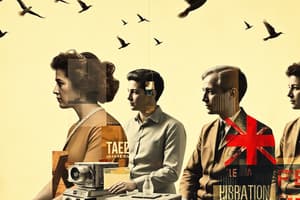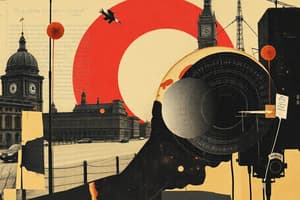Podcast
Questions and Answers
Which type of journalist may not have their faces or voices broadcast?
Which type of journalist may not have their faces or voices broadcast?
- Photojournalists
- Print Journalists
- Broadcast Journalists (correct)
- Multimedia Journalists
What distinguishes photojournalists from traditional photographers?
What distinguishes photojournalists from traditional photographers?
- They work exclusively in black and white photography
- They use digital cameras instead of film cameras
- They focus on portrait photography
- They prioritize capturing images that tell a story (correct)
Which type of journalist typically reports for newspapers or magazines?
Which type of journalist typically reports for newspapers or magazines?
- Broadcast Journalists
- Multimedia Journalists
- Photojournalists
- Print Journalists (correct)
What type of journalism encompasses written stories, still photos, video, and audio on a web page?
What type of journalism encompasses written stories, still photos, video, and audio on a web page?
How does media convergence blur the distinction between 'people in media' and 'people as media'?
How does media convergence blur the distinction between 'people in media' and 'people as media'?
What does 'People in media' refer to in the given text?
What does 'People in media' refer to in the given text?
What is the role of 'Citizen Journalism' as mentioned in the text?
What is the role of 'Citizen Journalism' as mentioned in the text?
What characterizes 'Opinion Leaders' as per the text?
What characterizes 'Opinion Leaders' as per the text?
What defines 'Social Journalism' based on the text?
What defines 'Social Journalism' based on the text?
Who can use the tools of modern technology and internet to create, augment, or fact-check media as mentioned in the text?
Who can use the tools of modern technology and internet to create, augment, or fact-check media as mentioned in the text?
Flashcards
Broadcast Journalist
Broadcast Journalist
A journalist who reports content that's broadcast through radio or television.
Photojournalist
Photojournalist
A journalist who uses photos to tell stories.
Print Journalist
Print Journalist
A journalist who writes for newspapers or magazines.
Multimedia Journalist
Multimedia Journalist
Signup and view all the flashcards
Media Convergence
Media Convergence
Signup and view all the flashcards
People in Media
People in Media
Signup and view all the flashcards
Citizen Journalism
Citizen Journalism
Signup and view all the flashcards
Opinion Leaders
Opinion Leaders
Signup and view all the flashcards
Social Journalism
Social Journalism
Signup and view all the flashcards
Non-professional Journalism
Non-professional Journalism
Signup and view all the flashcards
Study Notes
Types of Journalists
- Anonymous Journalists: Often work behind the scenes, and their faces or voices may not be broadcast.
- Photojournalists: Capture newsworthy events through images, incorporating storytelling and context, distinguishing them from traditional photographers who may focus solely on artistic compositions.
Reporting and Journalism Categories
- Print Journalists: Typically work for newspapers or magazines, focusing on written content.
- Multimedia Journalism: Engages various formats including written stories, still images, videos, and audio, often presented on web platforms for diverse storytelling.
Media and Convergence
- Media Convergence: Blurs distinctions between 'people in media' (professionals) and 'people as media' (the general public), enabling broader participation and engagement in content creation and dissemination.
Key Concepts in Journalism
- People in Media: Refers to established journalists, reporters, and media professionals who traditionally hold authority in the media landscape.
- Citizen Journalism: Empowers ordinary individuals to report news events using modern technology, allowing for real-time reporting and varied perspectives.
- Opinion Leaders: Individuals who influence public opinion through their insights, often serving as key figures within their communities and fields of expertise.
- Social Journalism: Combines social media engagement with traditional journalism, focusing on interaction and sharing among audiences to shape news narratives.
Emerging Media Roles
- Modern Technology Users: Any individual can utilize digital tools and the internet to create, enhance, or verify media content, democratizing information sharing and reducing reliance on traditional media outlets.
Studying That Suits You
Use AI to generate personalized quizzes and flashcards to suit your learning preferences.




